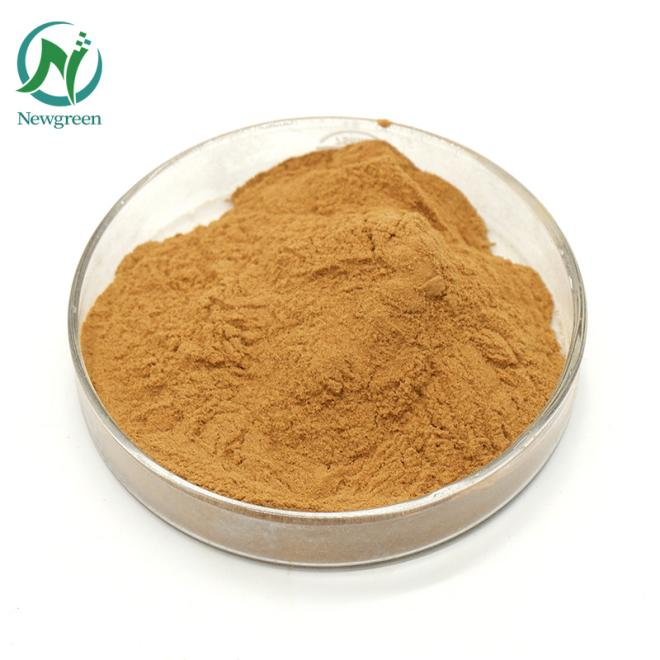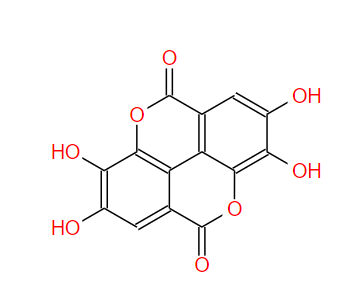
What Is Ellagic Acid ?
Ellagic acid is a natural phenol antioxidant found in various fruits and nuts, including strawberries, raspberries, blackberries, pomegranates, and walnuts. It is known for its potential health benefits, including its antioxidant and anti-inflammatory properties. Ellagic acid has been studied for its role in promoting cardiovascular health, supporting the immune system, and potentially contributing to cancer prevention.
In addition to its antioxidant effects, ellagic acid has been the subject of research for its potential anti-cancer properties, particularly in relation to its ability to inhibit the growth of cancer cells and to induce apoptosis (programmed cell death) in certain types of cancer.
Ellagic acid is also known for its potential to support skin health, as it can help protect the skin from UV damage and contribute to anti-aging effects.
Overall, ellagic acid is a bioactive compound with promising health-promoting properties, and it is often included in dietary supplements, skincare products, and functional foods due to its reported benefits.
Extraction Source of Ellagic Acid
Some common sources of ellagic acid include:
1. Berries: Ellagic acid is found in berries such as strawberries, raspberries, blackberries, and cranberries. These fruits are known for their high content of this beneficial compound.
2. Pomegranates: Pomegranate fruit and juice are also rich sources of ellagic acid, making them a significant dietary source of this compound.
3. Nuts: Certain nuts, including walnuts, contain ellagic acid, providing another source of this bioactive compound in the diet.
4. Other Fruits: While berries and pomegranates are the primary sources, smaller amounts of ellagic acid can also be found in fruits such as grapes, kiwi, and apples.
These natural sources of ellagic acid can be incorporated into the diet to obtain the potential health benefits associated with this compound. Additionally, ellagic acid is also available in supplement form, often derived from these natural sources.


What Is The Benefit of Ellagic Acid ?
Ellagic acid offers several potential health benefits, which are attributed to its antioxidant and anti-inflammatory properties. Some of the reported benefits of ellagic acid include:
1. Antioxidant Support: Ellagic acid acts as a potent antioxidant, helping to neutralize free radicals and reduce oxidative stress in the body. This antioxidant activity may contribute to overall health and well-being.
2. Potential Anti-Cancer Properties: Ellagic acid has been studied for its potential role in cancer prevention and treatment. It can inhibit the growth of cancer cells, induce apoptosis (programmed cell death) in certain types of cancer, and help prevent the spread of cancer.
3. Cardiovascular Health: Some research suggests that ellagic acid can support cardiovascular health by promoting healthy circulation and contributing to the maintenance of heart health.
4. Skin Health: Ellagic acid is known for its potential to support skin health. It can help protect the skin from UV damage and contribute to anti-aging effects, making it a common ingredient in skincare products.
5. Anti-Inflammatory Effects: Ellagic acid has been studied for its anti-inflammatory properties, which have implications for managing inflammatory conditions and promoting overall health.
What Is The Applications Of Ellagic Acid?
Ellagic acid has a range of potential applications across different industries due to its reported health benefits and versatile properties. Some common applications of ellagic acid include:
1. Dietary Supplements: Ellagic acid is used in the formulation of dietary supplements, often in the form of capsules, tablets, or liquid extracts. It is included for its antioxidant properties and potential health-promoting effects.
2. Skincare Products: Due to its reported benefits for skin health, ellagic acid is a popular ingredient in skincare formulations, including creams, lotions, serums, and masks. It is used for its potential to protect the skin from UV damage and contribute to anti-aging effects.
3. Functional Foods and Beverages: Ellagic acid is incorporated into various functional foods and beverages, such as juices, health drinks, and energy bars, to provide antioxidant support and enhance the nutritional profile of the products.
4. Nutraceuticals: Ellagic acid is utilized in the production of nutraceuticals, which are products that combine nutritional and pharmaceutical properties. It may be included in formulations aimed at promoting specific health benefits.
5. Research and Development: Ellagic acid is a subject of ongoing research, and its applications continue to expand as new potential benefits are discovered. Research is exploring its role in various health conditions and its potential as a natural remedy.
What Is The Side Effect Of Ellagic Acid ?
Ellagic acid is generally considered safe when consumed in the amounts typically found in foods. However, when taken in concentrated supplement form, there is the potential for side effects, particularly if consumed in excessive quantities. Some individuals may experience mild digestive discomfort, such as stomach upset or diarrhea, when taking ellagic acid supplements.
Additionally, as with any dietary supplement, it's important to be mindful of potential interactions with medications or existing health conditions. It's advisable to consult with a healthcare professional before using ellagic acid supplements, especially if you have any underlying health concerns or are taking medications.
As with any natural compound or supplement, it's important to use ellagic acid in moderation and to seek guidance from a healthcare professional to ensure its safe and appropriate use for individual health needs.

Related Questions You May Interested In :
How to absorb ellagic acid ?
Ellagic acid is naturally present in certain foods, and the body can absorb it through the digestive process when these foods are consumed. To enhance the absorption of ellagic acid from dietary sources, consider the following tips:
1. Consume Ellagic Acid-Rich Foods: Incorporate ellagic acid-rich foods such as raspberries, strawberries, blackberries, pomegranates, and walnuts into your diet to naturally obtain this beneficial compound.
2. Pair with Healthy Fats: Some studies suggest that consuming ellagic acid with healthy fats, such as those found in avocados, olive oil, or nuts, may enhance its absorption. Consider adding a source of healthy fats to meals containing ellagic acid-rich foods.
3. Consider Food Preparation: Certain food preparation methods, such as blending fruits into smoothies or adding berries to yogurt, may help release and make the ellagic acid more bioavailable for absorption.
4. Balanced Diet: Consuming a balanced diet that includes a variety of fruits, vegetables, whole grains, and healthy fats can support overall nutrient absorption, including ellagic acid
By incorporating these strategies, you can optimize the absorption of ellagic acid from dietary sources as part of a healthy and varied diet.
Is ellagic acid good for skin ?
Ellagic acid is believed to offer potential benefits for the skin. It is often included in skincare products due to its reported antioxidant and anti-inflammatory properties. These properties may help protect the skin from UV damage, reduce inflammation, and contribute to anti-aging effects. Additionally, ellagic acid has been studied for its potential to support skin health and may be beneficial in promoting overall skin wellness.
Does ellagic acid help with weight loss ?
Ellagic acid is not typically associated with weight loss. While it offers potential health benefits such as antioxidant and anti-inflammatory properties, there is limited scientific evidence to suggest that it directly contributes to weight loss.
If you are seeking solutions for weight management, it's advisable to focus on a balanced diet, regular physical activity, and healthy lifestyle habits. Additionally, consulting with a healthcare professional or a registered dietitian can provide personalized recommendations for achieving and maintaining a healthy weight.
Post time: Sep-09-2024





